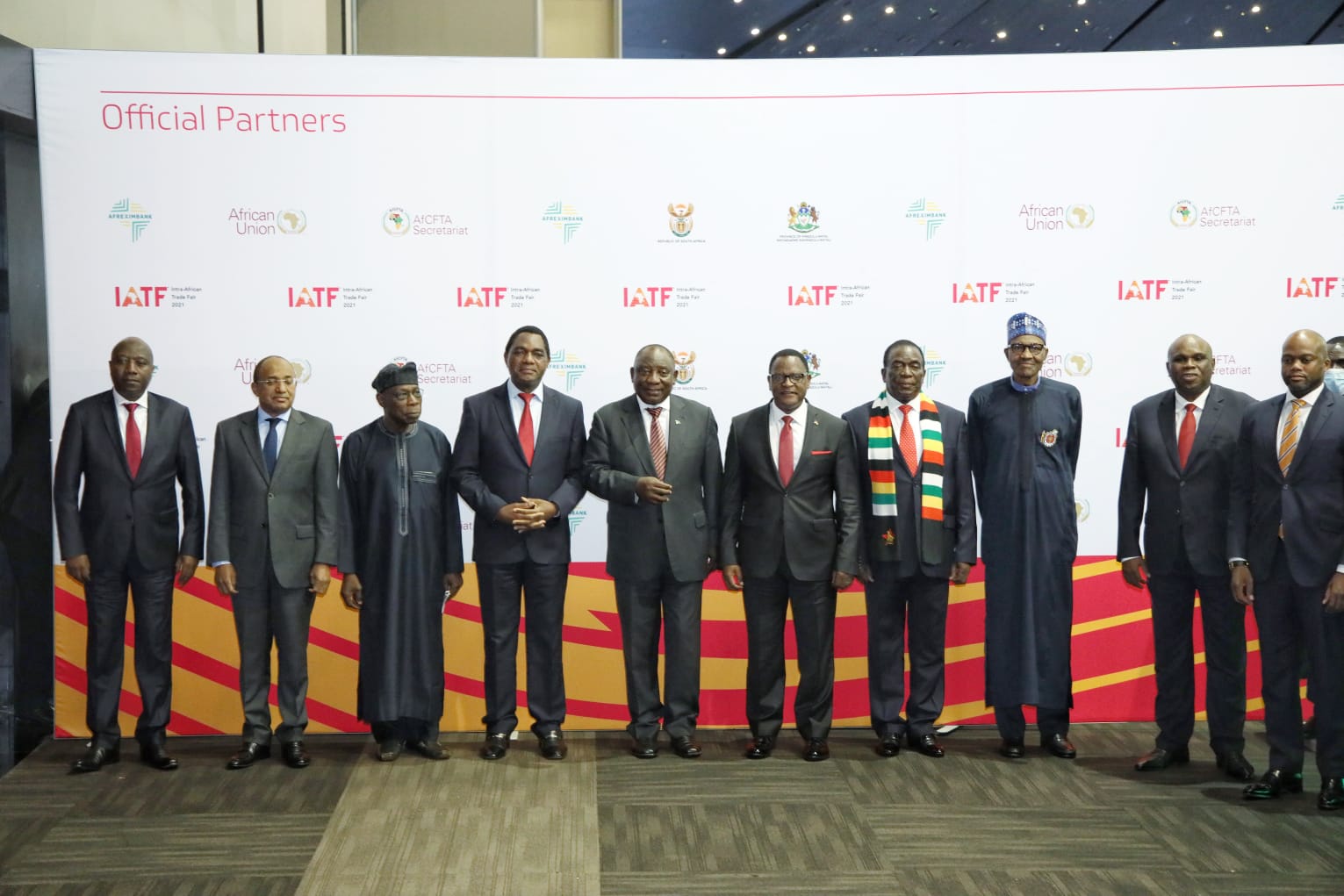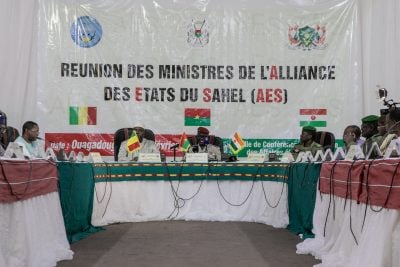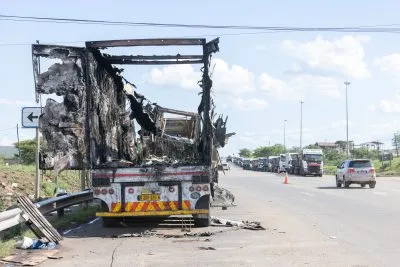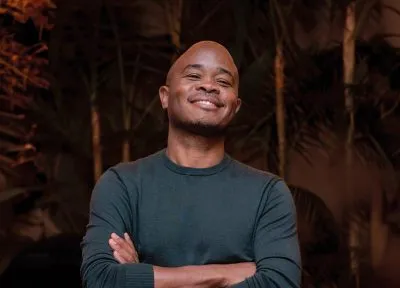With over 10,000 registered participants from 59 countries, the Intra-African Trade Fair (IATF) in Durban was the biggest pan-African business event to take place since the pandemic began.
The seven-day fair was organised by the African Export-Import Bank (Afreximbank) in collaboration with the African Union (AU) and the African Continental Free Trade Area (AfCFTA) Secretariat under the theme “Building Bridges for a Successful AfCFTA”.
It hosted over a thousand exhibitors in the Durban Exhibition Centre while the accompanying four-day conference in the city’s International Conference Centre brought together business leaders, senior officials and seven sitting heads of state.
On the final day of the trade fair on 21 November, Kanayo Awani, managing director of Afreximbank’s Intra African Trade Initiative, reported that deals worth $36bn had been signed during the event and that others had still not been completed.
She said that 1,161 exhibitors, including 838 companies from 59 countries of which 46 came from Africa, had showcased their goods and services in a massively successful event.
Building bridges for a successful AfCFTA
The AfCFTA was the central theme of the conference. With 54 African countries signed up, the free trade area, which began trading in January 2021 at the height of the pandemic, is the largest trading bloc to have been launched since the formation of the World Trade Organisation. African leaders are optimistic that it will be able to help unlock the continent’s economic potential.
South African President Cyril Ramaphosa opened the event on 15 November, declaring to delegates that “this trade fair is about building bridges. It is about connecting countries. It is about connecting people as well. Now Africa is taking concrete steps to write its own economic success story and this Intra-African Trade Fair is part of that story. Africa is opening up new fields of opportunity.”
In his address, President Muhammadu Buhari of Nigeria said “the African Continental Free Trade Area must make the effort to ensure that Africa must be a marketplace where no country is left behind, we must ensure that we create jobs and enhance revenues for all parties.”
The conference featured a series of panels across different sectors, including agriculture, automotives, e-commerce, logistics, politics, technology and tourism.
Obasanjo calls for creation of “Made-in-Africa” brand
On the third day of the IATF former Nigerian President Olusegun Obasanjo made a clarion call for the creation of an emblematic Made-in-Africa brand that will promote intra-African trade and boost the international export of African products.
Obasanjo told the audience that having such a brand would instil a sense of pride in each African country.

He said that the AfCFTA was working to remove the divisions that were brought about by colonialism, where Africa had been divided into regions based on the languages of the colonisers. According to him, the shared vision of IATF 2021 participants and traders is what will bring the AfCFTA to life.
“I have been impressed by the interaction of people at the IATF. People are working together, and this creates the environment in which miracles can happen,” he declared.
Talking tourism
With strict lockdowns and travel restrictions in place throughout the last two years, the tourism industry has gone through a period of unprecedented turmoil, and airlines came under significant financial pressure due to a drop-off in tourist numbers.
The “Think Tourism” panel on Thursday 18 November looked at ways to boost intra-African tourism given the reticence of many tourists to travel to parts of the continent because of low vaccination rates.
Abderahmane Berthe, secretary general of the African Airlines Association (AFRAA) pointed out that there were 18.1m tourists travelling in Africa in 2020, a 74.2% drop compared to 2019. The 18.1m tourists generated $14bn of receipts and represent 4.5% of the global number of tourists, according to the UN World Tourism Organisation.
Cuthbert Ncube, chairman of the African Tourism Board, urged African tourism boards and governments to work together to help tourism to recover from the pandemic.
“We need to start breaking the barriers that had separated us,” he said.
A strong domestic recovery in Africa would compensate for the drop in international demand, he added. The panellists said that the most successful tourism markets globally – such as the US, UK, Europe and Germany – have very strong domestic tourism industries, and this needed to be strengthened in Africa.
“We say Africa is open to business, but still it is a nightmare to travel from one member state to another. Integration between African states could enable our tourism sector to operate in a better way,” Ncube said.

The panellists then spoke about the future of airlines in Africa. One of the sector’s major casualties during the pandemic was already troubled South African Airways (SAA), which filed for bankruptcy and was privatised this year.
Africa’s “golden star” airline Ethiopian Airlines, which had emerged strong from the pandemic, is the latest carrier on the continent to run into trouble, with the country in civil war. Due to the instability, Addis Ababa, a major airline hub, will now be treated with caution by many tourists, the panel warned.
Talking tech
The conference also saw leading players in the technology sector discuss ways to increase investment into African technology companies, as well as the growth trajectory for different areas of the industry, including in fintech, health tech and mobile.
Angela Wamola, acting head of sub-Saharan Africa, GSMA, began the “Think Tech” session with a presentation on mobile connectivity in Africa. GSMA represents the interests of over 750 operators with nearly 400 companies in the broader mobile ecosystem worldwide.
Wamola emphasised that mobile money will be at the heart of the sub-Saharan economy in the future and said that 1.2bn people have currently registered mobile money accounts across Africa.
“The message is Africa is running the show when it comes to mobile money and therefore the lens we need to look at it is: mobile money is Africa’s greatest and key asset to lead for the digital economy,” Wamola said.
Wamola noted that in sub-Saharan Africa, 120m people will start using mobile money between 2020 and 2025, with almost a third from Nigeria and Ethiopia, driven by uptake among young people.
Fabian Whate, head of South African-based tech investment company Naspers Foundry, observed that at least 60% of venture capital investment in Africa is in the fintech sector. “This year we saw $4bn of venture investment [in Africa] that compares to an African economy of around $2 trillion. So really, we’re just beginning to scratch the surface.”
“As time moves on, we’re going to see further and further development across a broader array of sectors. As those sectors develop further and further, you’re going to see further capital come into them,” he added.
Precious Lunga, founder and CEO of Baobab Circle, a health tech startup using AI and automation to remotely support people with chronic health conditions, said the conversation has shifted around health tech since the onset of the pandemic.
“When we had the conversation four years ago, people didn’t understand why health tech would be relevant across the African continent, because everyone was looking at tech investment through the fintech lens. Since then, that’s definitely changed.”
Tanya van Lill, CEO of SAVCA (the Southern African Venture Capital and Private Equity Association), said she was optimistic about more venture capital funding coming into Africa.
“In South Africa, the venture capital industry is only 3% of the size of private equity and private equity in South Africa started in the mid-1980s. So if we’re already seeing $4bn invested on the continent, and it’s still a growing, nascent industry, just think what we can see in 20 years if it also has the opportunity to grow like private equity has.”
Van Lill said she has seen more investment in health tech, as well as an increase in e-commerce and commercial last-door delivery, as during the pandemic people would rather order online than go to the shops. She is also seeing a rise in edutech investment.
Final thoughts
In the closing plenary of the conference on 18 November, Acha Leke, Africa chairman at McKinsey, noted that Africa did not fare as badly from the Covid-19 pandemic from an economic perspective as previously feared, despite low vaccination rates compared to the rest of the world.
“The good news is that we didn’t lose 150m jobs as projected, we lost about 30m. So generally, we were not as affected as we feared by the crisis which makes it more exciting on one hand for investors to come and continue to invest in these markets.”
But he warned that Africa is in the midst of its third Covid-19 wave and vaccinations have been slow. The slow economic recovery has been compounded by Africa’s GDP slowing down even before the crisis.
However, he was upbeat about significant investments made in Africa’s health sector and prospects for the future: “25% of all the vaccines in the world are administered in Africa, but Africa produces only 1% of the vaccines. Again, it’s a massive opportunity,” he said.
Leke was joined on the final panel by a string of politicians, executives and senior UN officials, including South African trade minister Ebrahim Patel, former Botswana trade minister Bogolo Joy Kenewendo and Ibrahima Diong, UN assistant secretary general and director general of African Risk Capacity.
There were many talking points from the week, butAbdou Diop, managing director at Mazars, an international audit, tax and advisory firm in Morocco, provided a good summary of what Africa needs to do to prosper:
“Africa is really full of resources, the continent is very young, it’s innovating, creating, investing.
“We need to educate, to industrialise, to gain food security, to bring energy to the countries, and all these put together will bring jobs. Also, we need to make sure this African free trade happens – because sometimes we have some countries that sign today and other days they close their borders.”
Following the conference, two days were devoted to Africa’s creative industries in a programme organised by the Creative Africa Nexus (CANEX).
Africa’s creative industry can create millions of jobs
The Creative Africa Nexus (CANEX), a programme put in place by Afreximbank to support Africa’s creative and cultural industries, ran for two days after the end of the conference.
Designed specifically for African creatives including digital innovators and experts, fashion, film, and music actors looking for ways to monetise their content across the digital landscape, the forum is a space to share, discuss and create solutions that will encourage creatives to find innovative ways to use existing technology to increase their remuneration and thrive in their careers.
It brought together the leading lights of Africa’s creative sector through substantial exhibition space, business to business/government meeting opportunities and a comprehensive programme of conversations, panels discussions, live performances, installations and screenings.
Benedict Oramah, president and chairman of the Board of Directors of Afreximbank said that the young men and women in the creative sector have turned it into tradable services with a global reach, appeal and impact.

“At Afreximbank,” he said, “we fully understand the power of the creative industry to catalyse intra-African trade, create millions of jobs for the continent’s young population, and promote the emergence of national and regional value chains. We also know the power of creatives to catalyse industrial development because this is a bankable industry.”
About $128m of the $500m facility set aside as seed capital by Afreximbank towards CANEX has already been invested in the form of loans to artists and facilitation of initiatives aimed at activating the nexus.
The third edition of IATF will take place in Abidjan, Côte d’Ivoire, in 2023.
Want to continue reading? Subscribe today.
You've read all your free articles for this month! Subscribe now to enjoy full access to our content.
Digital Monthly
£8.00 / month
Receive full unlimited access to our articles, opinions, podcasts and more.
Digital Yearly
£70.00 / year
Our best value offer - save £26 and gain access to all of our digital content for an entire year!
 Sign in with Google
Sign in with Google 



